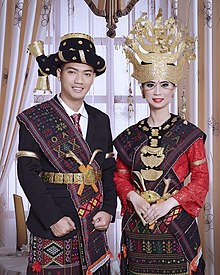|
Angkola people
The Angkola (also known as Angkola Batak) people are part of the Batak ethnic group from North Sumatra who live in the South Tapanuli regency. The Angkola language is similar to Mandailing language also with Toba language, but it is sociolinguistically distinct.[2] The name Angkola is believed to have originated from the Angkola River or Batang Angkola, which was named by an officer called Rajendra Kola[3] (Angkola or city lord) who was passing through Padang Lawas and later came to power there. The southern (downstream) part of the Angkola River is called Angkola Jae, while the northern (upstream) part is called Angkola Julu.[4] The Angkola people practice patrilineal kinship, and the clans and surnames of the Angkola people are based on the patrilineal system. There are only a few Angkola surnames - Siregar, Dalimunthe, Harahap, Hasibuan, Rambe, Nasution, Daulay, Tanjung, Ritonga, Batubara and Hutasuhut, amongst others.[5] Angkola society strictly prohibits marriage between people with the same surname. Most of the Angkola are Muslim while a small minority are Christian.[6] References
|
||||||||||||||||||||||
